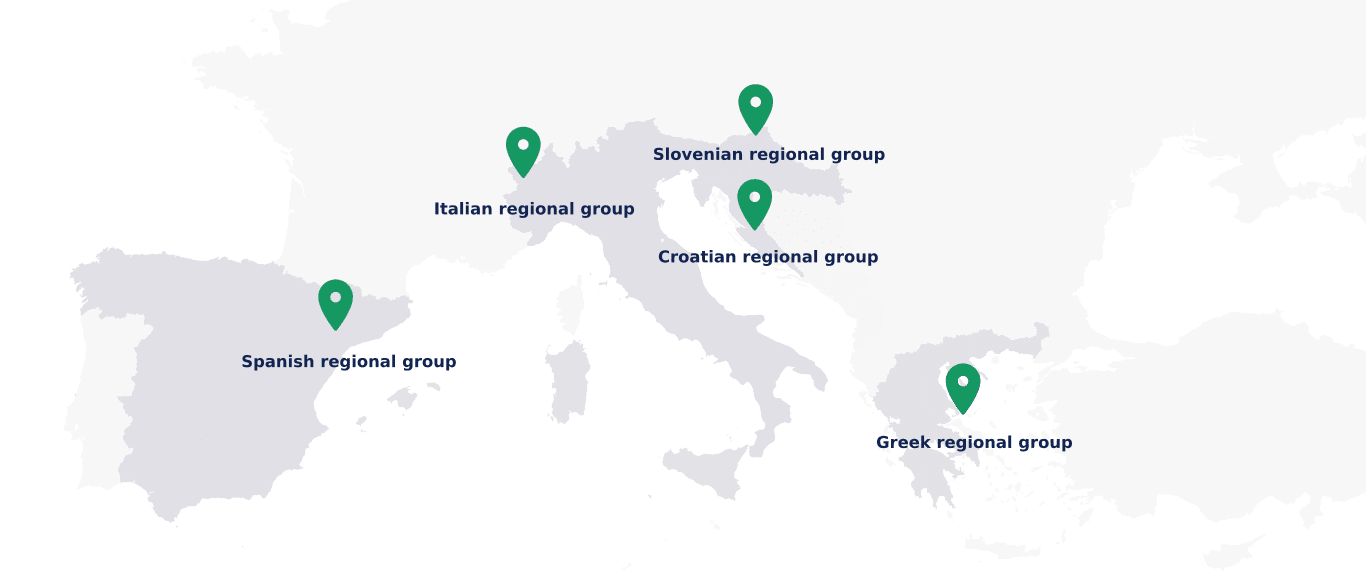Regional Groups
The regional groups are the channel through which the ETU Initiative is transferred to local communities. The purpose of these groups is to support municipalities from a variety of Mediterranean territories to apply the ETU in their region. Through these groups, the participants attend trainings on the ETU Toolbox, receive knowledge directly from experts, and gain support in applying the ETU to their own projects, while strengthening their network.

Spanish regional group
The Spanish regional group brings together municipalities from across the country. Most participants come from Catalonia and Valencia, whilst the group also has representatives from Andalusia, Aragon, Murcia and Navarra. 47% of the Spanish municipalities involved in the ETU Initiative are rural towns and villages with less than 500 inhabitants; 27% of the municipalities have a population of 500-5,000, and 21% have 5,000-60,000 inhabitants. The final 5% are from cities with over 60,000 inhabitants. The main interests of these municipalities are to develop local communities for developing renewable energy, to gain support creating energy and climate action plans, and to establish energy transition projects.
Italian regional group
The Italian regional group is a heterogeneous mix of municipalities and local authorities from rural, island, mountainous, and urban areas, with many participants especially interested in creating renewable energy communities (RECs) in their region. In Italy, regulation regarding RECs is relatively new and provisional, but there is a high interest among local authorities to strengthen this. However, these authorities lack information and support to understand what is possible, and to implement RECs for the benefit of their residents. Most participants in the Italian regional group come from the regions of Piedmont, Lombardy, Campania and Sicily. The characteristics of these municipalities vary, with populations ranging from 56 inhabitants to 70,000, and with from a variety of socio-economic contexts.
Slovenian regional group
The Slovenian regional group is made up of rural and urban municipalities, as well as local energy agencies as observers. The municipalities’ populations range from 2,500-30,000 inhabitants, and represent a variety of territories and contexts in south-eastern Slovenia. The main interests presented by the group are related to establishing their own energy transition projects, and developing Sustainable Energy and Climate Action Plans (SECAPs) under the Covenant of Mayors initiative.
Croatian regional group
The Croatian regional group is a heterogeneous group, composed of municipalities from rural and urban areas from the following regions: Zagreb County, Krapina-Zagorje County, and Karlovac County. The size of the participating municipalities ranges from 10,000-70,000 inhabitants, and represent a variety of environmental and socioeconomic contexts. The main interests of these municipalities are to develop renewable energy projects, Sustainable Energy and Climate Action Plans (SECAPs) under the Covenant of Mayors initiative and Sustainable Urban Mobility Plans (SUMPs).
Greek regional group
The Greek regional group includes 12 island municipalities with populations ranging from 500-120,000 inhabitants. 25% are islands with less than 1,000 inhabitants, while an additional 25% represent islands with between 1,000-10,000 inhabitants. 33% of the islands have a population of 15,000-40,000 residents, while the final 17% are islands with over 50,000 inhabitants. 58% of these islands are not connected to mainland electricity sources. The interests raised by the municipalities include developing local energy communities, Sustainable Energy and Climate Action Plans (SECAPs) under the Covenant of Mayors initiative, and local energy transition projects. The municipalities have also highlighted integrating their energy projects with efforts to tackle other sustainability challenges, such as waste and water management.